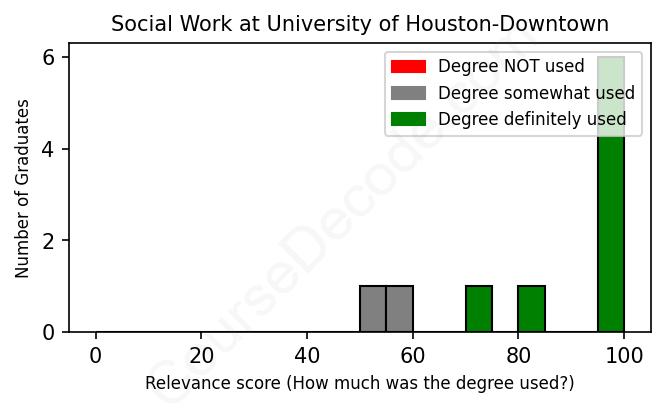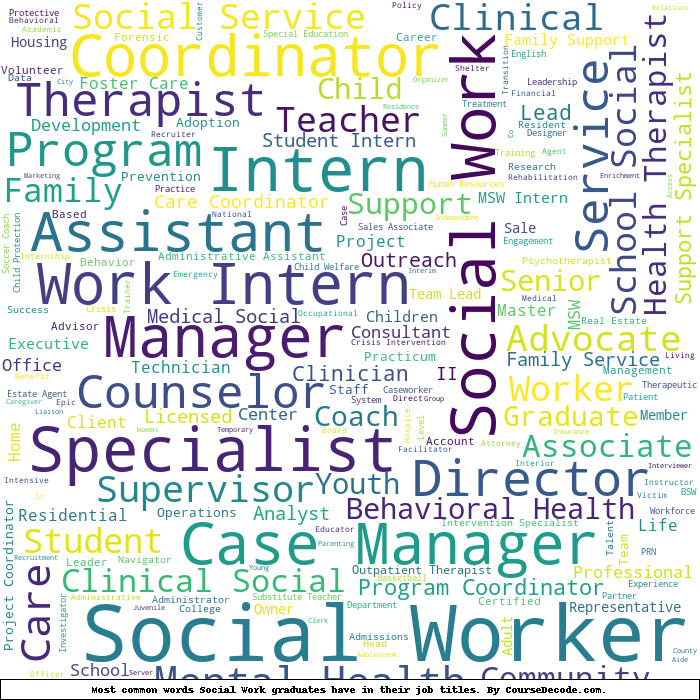
First, some facts. Of the Social Work graduates from University of Houston-Downtown we've analyzed , here's how many have used (or NOT used) their degree in their career:

These are estimates based on AI analysis of 10 LinkedIn profiles (see below).
The verdict? Significantly above average. Overall, with an average relevance score of 86%, Social Work graduates from University of Houston-Downtown have a much higher likelihood (+19%) of finding work in this field compared to the average graduate across all fields:
And for comparison, here's the chart for all profiles we've looked at across all degrees.
Also, after graduating, 70% of these graduates have pursued further education other than another Bachelor's degree (such as a Masters degree or other), compared to the average across all profiles of 35%. This suggests you may need more than just a Bachelors degree to be competitive as a Social Work graduate.
See the details:
|
Relevance score: 100% We think this person has gone into a career highly relevant to their degree. We think this person has gone into a career highly relevant to their degree.
DEGREE INFOGraduated in 2016 from University of Houston-Downtown with a Bachelor's degree in Social Work. Also pursued further education since (see below). JOB HISTORY SINCE GRADUATIONLMSW Case Manager|Therapist Abundant Life Theraputic Services Aug 2018 - Aug 2019 LMSW/ Therapist  Kingwood Pines Hospital, LLC Jul 2019 - Nov 2019 Licensed Master Social Worker  Maxim Healthcare Group ( King County IQ-site) Apr 2020 - Oct 2020 Licensed Master Social Worker  Wellfound Behavioral Health Hospital Jul 2020 - Jul 2021 Licensed Master Social Worker  Maxim Healthcare Group (Swedish ER- Contract) Jul 2021 - Present FURTHER DEGREES DONE SINCE GRADUATINGMaster of Social WorkStephen F. Austin State University 2016 - 2017 ABOUTHealthcare Industry Versatile leader and experienced social worker with 20+ years excelling in the healthcare industry. Scholar-practitioner specializing in contemporary social work theories and putting those theories into practice. Leadership: Administration and Budgets Data-driven Improvement Pre- and Post-Employment Process Improvement Program Development Organizational Development Strategic Planning Team BuildingSocial Work: Assessment Counseling Clinical Judgment Compliance: Federal, State, Local Crisis Management Medical Terminology Needs Identification |
The top 10 most common jobs done by the graduates we've analyzed (ranked most common to least) are:
When looking at the jobs held by graduates from the University of Houston-Downtown with a degree in Social Work, most of them have landed roles that either directly utilize their social work skills or are tangentially related. A significant number of these roles are in case management, counseling, and various positions focused on community assistance, which often require strong social work foundations. For example, positions like Employment Counselor, Case Manager, and Program Coordinator are prominently featured and indicate a strong reliance on skills learned during their studies. Many of these jobs involve direct interaction with clients, advocacy, and resource management—core components of the social work practice.
However, not every position aligns perfectly with the social work field. There are roles like Greeter or Senior Secretary that, while possibly involving some social work principles, mostly revolve around administrative tasks or customer service, which aren't as grounded in the professional practice of social work. Overall, it seems like the majority of these graduates are applying their social work knowledge in meaningful ways, especially in positions that require direct client support and advocacy for vulnerable populations, proving that their education is both relevant and valuable in the workforce.
Here is a visual representation of the most common words in job titles for Social Work graduates (this is across all Social Work graduates we've analyzed, not just those who went to University of Houston-Downtown):

Based on what I've seen from graduates of the University of Houston-Downtown with degrees in Social Work, it looks like most of them are finding themselves in pretty solid career paths, especially in the social services sector. For many, their first jobs after graduating tend to be entry-level positions in organizations dedicated to helping people, like case management or counseling roles. You can see graduates starting out as case managers, employment counselors, or even interns in various organizations. This makes sense since those roles help them get practical experience and become more knowledgeable in the field right off the bat.
As time goes on, the trend shows that many of these graduates advance quite a bit in their careers, often staying within the same organizations but moving up to higher positions like coordinators, managers, and eventually directors. For example, someone who started as a case manager at an organization eventually became a director of employment services. However, there are a few cases, like the recent graduate who’s working as a secretary at a cancer center, that suggest sometimes graduates might not find roles directly within social work. Still, overall, it seems like a number of these alumni are doing well, making valuable contributions in fields that are relevant to their training. It's encouraging to see that they are able to build meaningful careers in the social work landscape!
Honestly, a Bachelor’s degree in Social Work (BSW) at the University of Houston-Downtown is pretty challenging but manageable if you’re dedicated and passionate about the subject. You’ll dive deep into topics like human behavior, social justice, and community resources, and there’s a good amount of coursework and fieldwork involved. It's not a walk in the park, but if you enjoy helping people and are willing to put in the effort, you'll find it rewarding. Compared to degrees in more technical fields, it’s often seen as a bit easier since it leans heavily on critical thinking and communication rather than hard sciences, but that doesn’t mean it’s a cakewalk either. Just be prepared to keep up with readings, assignments, and sometimes emotional work, since you'll be learning about real-life issues that can be pretty heavy.
Most commonly, in the LinkedIn profiles we've looked at, it takes people 3 years to finish a Bachelor degree in Social Work.
Looking at the job histories of these Social Work grads from the University of Houston-Downtown, it seems like their earnings vary quite a bit. Some have steadily climbed the career ladder, especially those who moved up to director or managerial roles, which usually come with decent paychecks—like the Director of Employment Services at MAM who has been promoted a couple of times. However, others are still in entry-level or support roles, like the Greeter at Neighborhood Centers Inc. or the Senior Secretary at MD Anderson, which might not offer a high salary, especially given the cost of living these days. Overall, it looks like while some are doing pretty well financially, others might still be working their way up and not making a ton just yet. It’s definitely a mixed bag!
Here is a visual representation of the most common words seen in the "about" section of LinkedIn profiles who have a Bachelor degree in Social Work (this is across all Social Work graduates we've analyzed, not just those who went to University of Houston-Downtown). This may or may not be useful:

Here are all colleges offering a Bachelor degree in Social Work (ordered by the average relevance score of their Social Work graduates, best to worst) where we have analyzed at least 10 of their graduates: